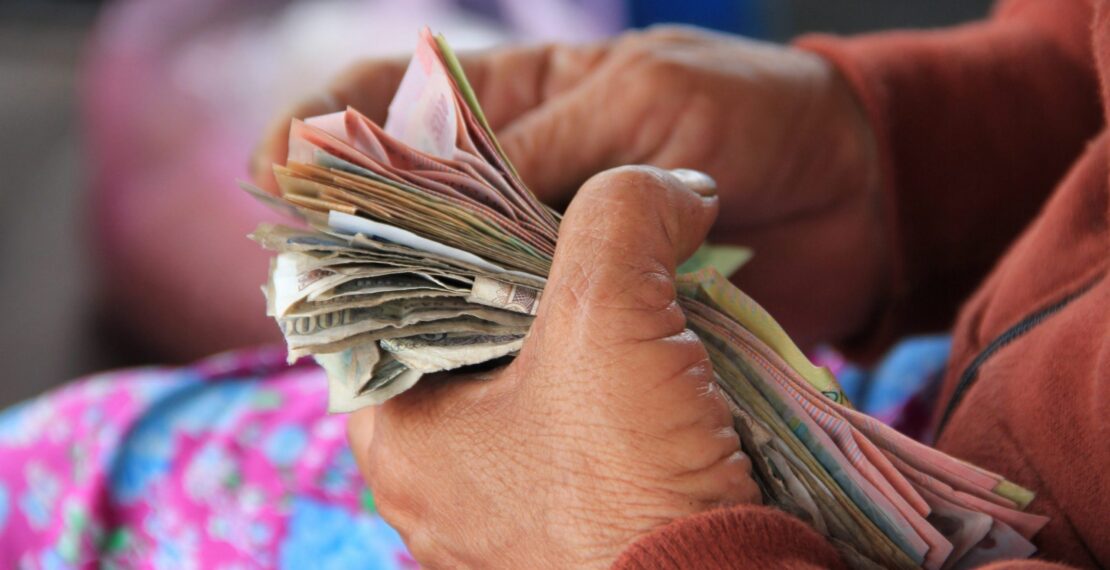Compassion is not the first thing that comes to mind when we think of economics or the stock market. Modern economics is more often a negative force than a positive one. Debt, bribery, greed and corruption are always associated with money – values like love and empathy, not so much.
Does this make money bad, by default?
Well, no, for money is merely a means of exchanging value within society. However, when used within our current neoliberal economic system, money ends up being the crumbling foundation on which we continue to build our extravagant society.
Fortunately, following such a short-sighted path isn’t the only economic way in which humanity can journey into the future.
What if, instead, we could create a form of economics that didn’t create debt, but negated it? What if, instead, we lived in a world with a compassionate currency that rewarded good deeds rather than greed?
A SACRED ECONOMY
Charles Eisenstein, author of ‘Sacred Economics’, argues that this world is possible. We could create a system of negative-interest, where hoarding unnecessary money devalues it; meaning, individuals would be better off giving it (or ‘gifting it’ in Eisenstein’s terminology) to someone who needs it more. In such a system, debt would not continue to grow, and the concept of usury would be deemed irresponsible in a world of finite resources.
Eisenstein states that his idea of a Sacred Economy can actually be achieved – even if it does sound a little far-fetched. In his book, he lays out plans for getting closer to a negative-interest system, practical steps we need to take to live in a better, more compassionate world.
But how can we hope to change things if the people in charge continue to value greed and wealth above everything else? Surely, to achieve a Sacred Economy, we need to change the underlying values and principles driving our money-related motives.
Why not start with the system we already have?
What if we lived in a world with a compassionate currency that rewarded good deeds rather than greed?
PSYCHEDELIC GO-GETTERS
More and more high-powered, ambitious businesspeople are using psychedelics to get ahead in their jobs. They take microdoses, tiny amounts of psychedelics, twice a week with their morning coffee. Scores of people are reporting that microdosing improves creativity, productivity, energy.
In fact, psychedelics are beginning to take the place of typical nootropics like amphetamines and caffeine, an interesting, if not illicit, development in the technological hotbeds of Silicon Valley and the larger Bay Area.
Here are just some accounts of people using microdosing to get ahead in business, from the microdosing subreddit:
I started microdosing LSD, to feel better. It is my miracle, and my best kept secret. I feel like a changed man. Yesterday’s interview was so awesome. I was struggling with if I should go on microdose or not, but I decided “fuck it”. I went and killed it. I knew the job was mine before the interview was over
I get a boost to creativity, I have recently started my own business and so designing the logo, website etc. was much easier with microdosing and also in terms of how I can develop the business model
I managed to think quite analytically about some software issues we’re having at the moment and I comprehended the feedback my tester gave me. I don’t find the thought of working offensive at all
I think it really enhanced my analytical thinking. I think it helped me think better on technical subjects. But as far as “speeding up” or “slowing down” my thinking process, I think it just provided new paths and ways to think about things
We’ve also collected dozens of accounts of the effectiveness of microdosing in a business setting through our recent survey:
It made me see things in a different light and consider new perspectives, allowing me to approach old issues in new, exciting ways
I am able to turn a phrase a little quicker sometimes, or more easily synthesize a concept into one sentence […] Notably – I normally cannot write articles in the evening. I can do so easily when microdosing
While I was working on a project during the day and I was microdosing, I would give it much more effort and time and I was really enjoying what I was doing without getting lost somewhere else or taking breaks from time to time. I was living at the moment without any distraction from outside. It made what I do more enjoyable
My positivity had sky rocketed, and I feel that it outputs such a positive energy force that it was attracting positive results in my workplace- such getting new clients, treating my staff better, the list can truly go on
I was always solution oriented, but I’ve seem to notice more problems and in much quicker time the solution comes to me
Listen to our podcast episode with Michael Costuros talking about How To Convince Your Boss To Go On A Psychedelic Retreat or Click here to read the transcript
AN ‘OPEN’ MARKET
Although these go-getters are using psychedelics for problem-solving and productivity, they might also experience some unwanted side-effects, like an increase in compassion, openness and empathy.
That’s right – studies suggest that psychedelics can increase the personality trait of “openness”, that is, being less prejudiced, more accepting, and more willing to see things from other people’s perspectives. This is pretty astounding, considering our main personality traits are usually set in stone once we reach adulthood. Psychedelics could be creating more compassionate people without them even knowing it.
Indeed, over the next few decades as the use of psychedelics becomes more commonplace in the business world, more compassionate business ventures will likely come to fruition (causation versus correlation is an important conversation to have – but one that is too extensive for this article) that consider the impact of social, community, and environmental externalities.
Benefit Corporations (B-corps) immediately come to mind when discussing such a transition. B-Corps are a type of for-profit corporate entity that includes a positive impact on society, workers, the community, and the environment – in addition to returning profit – as its legally defined goals.
“Psychedelics can increase the personality trait of “openness” – making you less prejudiced, more accepting, and more willing to see things from other people’s perspectives”
The number of B-corps is already skyrocketing. In April 2010, Maryland became the first state to pass benefit corporation legislation. Today, in January 2017, there are already 2,000 certified B-Corporations, and an additional 10,000 non-certified B-corporations (the difference between certified and non-certified B-corps is best explained in this article).
Examples of B-Corps include the likes of Patagonia, Ben & Jerry’s, Kickstarter, and Etsy. Kickstarter decided to incorporate into a B-corp to make sure they wouldn’t sacrifice their goal – fostering creative endeavors – for the sake of pure profit. Patagonia, a B-corp for several years, donates 1% of its sales to various environmental causes. Overall, a shift in the business psyche towards a B-corp philosophy could really make a difference to the world.
The key to creating a Sacred Economy isn’t in a sudden change or revolution. Instead, the key to a new world is a gradual change in the way we perceive our external surroundings. We need to learn that our personal and community well-being is not a zero-sum game.
Instead, our health is dependent on an intricate system of personal and community evolution within a larger ecological system. Psychedelics could be the crucial tools to developing this new world, a world where community is more important than self, and sharing more important than accumulation.
SMALL DOSES, BIG CHANGE
Microdosing will be an important part of the development of a Sacred Economy. Of course, certain naysayers will discount the advent of microdosing, claiming it is either representative of America’s obsession with fads or that it only serves to emphasize the current neo-liberal economic system we live in.
However, based on our current economic climate, and the failure of mainstream medicine to address specific mental health deficits, microdosing will only continue to grow in popularity.
As business becomes less industrial and more focused on creative problem-solving (hence, the boom we see from Silicon Valley), individuals will require specific tools to help with outside-the-box, innovative thinking. Microdosing will continue to be one of the many tools that business leaders use from their proverbial innovation toolbox.
“Microdosing will be an important part of the development of a Sacred Economy.”
Also, as outlined in Anatomy of an Epidemic, our current system of medicine has largely failed those who struggle with depression, anxiety, bipolar disorder, and schizophrenia. While some medications have efficacy in helping to manage symptoms, none work to address the underlying cause of these major issues. Based on anecdotal evidence collected thus far – and rigorous evidence collected from higher doses of psychedelics – psychedelics show efficacy in helping to address the underlying symptoms for mental health problems unrelated to psychosis.
Finally, psychedelics produce a more open and compassionate mindset in those who use them. From anecdotal reports collected thus far, many individuals notice similar benefits from a long-term protocol of microdosing when compared to the benefits from one intense psychedelic trip. For this reason, we believe the advent of microdosing will likely lead to a more ‘open’ personality, regardless of the specific setting in which they are consumed.
While it is unlikely that any high-end stock brokers will leave their jobs to join communes in the Amazon, growing cultural trends indicate significant movement towards an economic system that is more equitable, just, and fair for all.
Microdosing will be one of the many keys that nudges global consciousness towards a more sacred economy.
If you’re interested in starting a microdosing protocol, check out our Microdosing Course. We’ll guide you through the basics—then dive much deeper, helping you tailor your routine to meet your personal goals.







